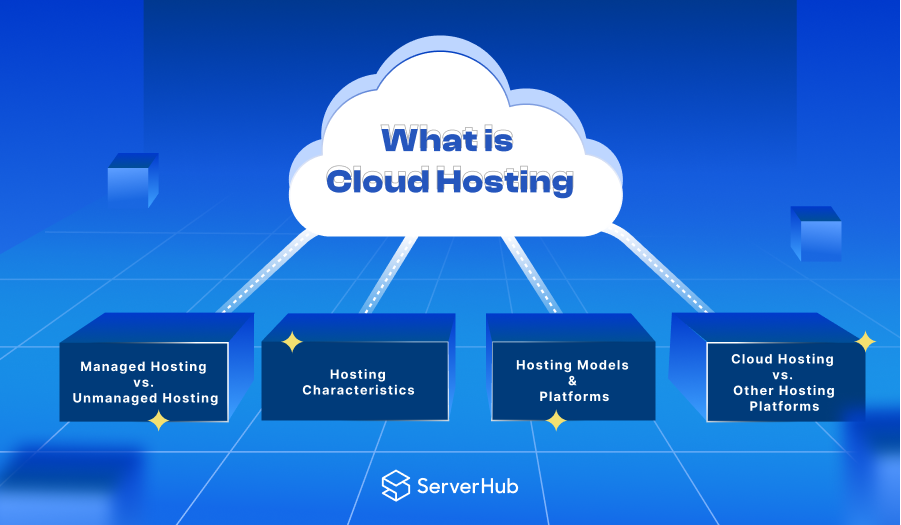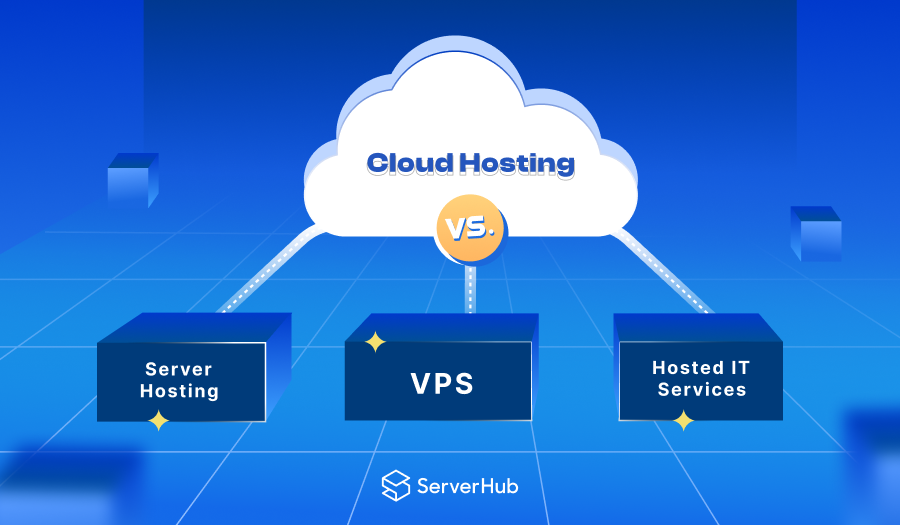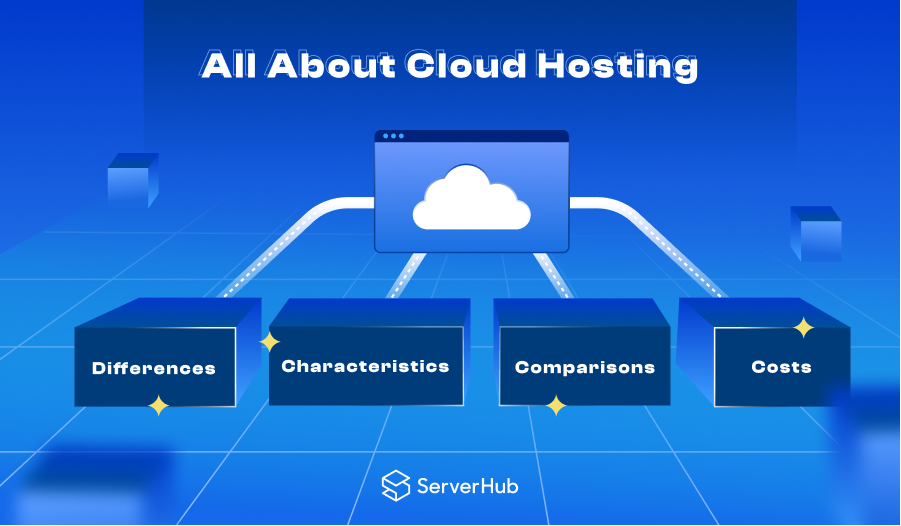Cloud hosting has recently become popular as businesses and individuals seek to reduce their reliance on traditional on-premises IT infrastructure. In this article, we will explore what is cloud hosting, the cloud hosting types, models, platforms, characteristics, comparisons with other hosting types, and costs.
What is Cloud Hosting
 Cloud hosting allows applications and websites to be hosted and accessed through cloud resources instead of a single physical server. It involves a cloud hosting provider pooling computing resources from a network of servers to provide scalable and flexible hosting solutions. The provider uses a network of interconnected servers located in different datacenters to create a virtualized hosting environment where resources can be allocated and distributed as needed.
Cloud hosting allows applications and websites to be hosted and accessed through cloud resources instead of a single physical server. It involves a cloud hosting provider pooling computing resources from a network of servers to provide scalable and flexible hosting solutions. The provider uses a network of interconnected servers located in different datacenters to create a virtualized hosting environment where resources can be allocated and distributed as needed.
Differences Between Managed and Unmanaged Cloud Hosting
Managed and unmanaged cloud hosting are the two types of secure cloud hosting services. If you are selecting between these two, this section can help you decide which is the best hosting type for your websites and applications.
Managed Cloud Hosting
This is a type of secure cloud hosting server where the hosting provider manages and maintains on behalf of the clients the server infrastructure and technology required for hosting applications and websites. The provider takes care of server setup, configuration, maintenance, security, software updates, and other technical tasks so the customers can focus on their core business activities.
With managed cloud hosting, you can access a range of services and tools to help you efficiently manage your applications and websites. These include features like automatic scaling, data backups and recovery, load balancing, and monitoring and analytics tools.
Many managed cloud hosting providers offer different levels of service, ranging from basic infrastructure management such as automated backups and security monitoring to more advanced services like application management and performance optimization.
Managed cloud hosting is ideal for businesses that require high performance, security, and reliability for their websites and applications. It’s a good option for you if you want to take advantage of the scalability and flexibility of cloud computing without having to manage and maintain the underlying infrastructure yourself.
Unmanaged Cloud Hosting
This is a type of hosting service where the cloud hosting provider will only provide the infrastructure, network connectivity, and other basic services. The provider will make sure the machine hardware is up-to-date, fix or replace defective parts, and other matters related to the server hardware.
With unmanaged hosting, you are responsible for managing the server, applications, and data themselves. You have full control over your virtual server and can customize it to meet your specific needs. However, you will have to manage and maintain everything related to the software side of the cloud hosting.
You will also take care of other technical aspects of the hosting, including installing and configuring the operating system, setting up the web server, installing and maintaining necessary software, and configuring security settings. You are also responsible for monitoring the server, ensuring that it is secure, and taking care of any necessary backups or updates.
Unmanaged hosting is ideal for users who have technical expertise and want complete control over their hosting environment. It can be more affordable than managed hosting, but it also requires more technical knowledge, resources and responsibility on the part of the customer to manage it effectively and efficiently.
Characteristics of Cloud Hosting
There are several features of cloud hosting or cloud computing that make it advantageous compared to other web hosting solutions. These characteristics include:
1. On-demand self-computing
This feature of secure cloud hosting allows you to directly monitor computing capabilities, server uptime and allotted network storage. The on-demand self-service helps you to monitor and provision computing abilities and resources as needed so you can make better decisions for the services provided by your website.
2. Straightforward maintenance
The hosting provider directly manages and maintains the cloud server machines with the provider doing the maintenance, resulting in low or no downtime for your services. The secure cloud hosting also undergoes regular updates to optimize the cloud server’s computing capabilities and resources.
3. Global network access
You can access and transfer your data in the cloud from any location using any Internet-connected platforms such as desktops, laptops, mobile phones and tablets. You have access to computing capabilities and resources are provided over standard networks such as the Internet, or through local area networks if provided over private cloud hosting services.
4. Resource pooling
A cloud hosting provider can share resources such as applications, networks, servers and storage among multiple users and they are provided the same secure cloud hosting services from the same physical resource. Resource pooling allows you to reduce significant computing costs and helps in the dynamic pooling of resources that allows you to deliver computing services to several customers.
5. Rapid elasticity
This is the ability of the hosting provider to quickly allocate varying resources according to their customers' needs. It allows users to expand or reduce their resources how and when they would like. Rapid elasticity helps you to cost-effectively run workloads that need a large number of servers for only a short period of time.
6. Flexible measured service or Charge-per-use-service
Secure cloud hosting services providers measure all types of usage by offering charge-per-use metering capability to control, monitor and optimize the client’s use of resources. Measured service provides efficient monitoring billing, optimal use of resources, and transparency between you and the hosting provider.
7. Multi-tenancy infrastructure
This feature allows multiple users to share the same physical infrastructure or the same physical resources. Customers share the same computing resources under multi-tenancy, but each of their data is kept separate and safe, which greatly reduces security risks such as the spreading of a cyberattack to other users using the same infrastructure.
8. Automation
This feature allows you to deploy and manage resources with minimum interaction on your part through installed configurations that automatically monitor and maintain the cloud computing services. Automated cloud computing also provides transparency between the hosting provider and client.
8. Security
Hosting providers create a copy of every stored data to prevent any form of data loss if ever any of the server machines are damaged. Secure cloud hosting stores data in storage devices, which prevents hacking, utilization by unauthorized users and protects the privacy of sensitive information.
10. Resilience
Secure cloud hosting services are designed with fault tolerance and redundancy to give the service the ability to swiftly recover from any disruption. Resilience provides reliability and high availability so you can access your services remotely from any location.
11. Flexible payment models
Many cloud hosting providers pay-per-service or per-space, spot pricing, subscription-basis only and other flexible payment options so you can choose the payment model that best suits your needs.
Cloud Hosting Models and Platforms
If you host most or all of your websites and applications in cloud hosting, there are several cloud hosting related topics that may be related to your online business and you may need to be familiar with. These topics include:
1. Hybrid Cloud Hosting
In a hybrid cloud hosting setup, some applications and data are hosted in a private cloud, while others are hosted in a public cloud. An advantage of this setup is that it allows you to keep sensitive or critical data on your private cloud servers, while taking advantage of the scalability and flexibility of public clouds for other workloads.
2. Linux Cloud Hosting
Instead of running applications on local physical servers or dedicated servers, the application runs on virtual servers that are created and managed in the cloud based on Linux based OS. Linux cloud hosting’s benefits include reliability, flexibility and ability to run efficiently on reduced hardware resources offered by the cloud hosting providers.
3. Magento Cloud Hosting
Magento is an open-source e-commerce platform that allows users to create and manage the look, content and functionality of their online stores. It is specifically designed and optimized for running Magento-based websites and online stores. This type of hosting includes features such as auto-scaling, load balancing, and advanced security features to ensure high availability and performance for Magento-based online stores.
4. Cloud Hosting for WordPress
WordPress is a content management system for creating and managing websites. Many WordPress users who want to host their sites on the cloud will have to decide first what is the best cloud hosting for WordPress. Take note that the best cloud hosting type for WordPress websites will depend on your specific budget needs and technical requirements.
Available cloud hosting solutions for WordPress:
- Virtual private server (VPS) cloud hosting – This option provides more resources and control than shared hosting. With VPS, your website has dedicated resources, which means that it can handle more traffic and you have more control over the server.
- Dedicated cloud hosting – This is the most expensive option, but provides the highest level of performance and control. With dedicated cloud hosting, you have an entire server to yourself, which means that your website can handle large amounts of traffic without slowing down.
- Managed cloud hosting – This type of hosting is ideal for those who want a hands-off approach to managing their website. With managed cloud hosting, the hosting provider takes care of everything from backups to security updates, leaving you to focus on managing business aspects.
- Shared cloud hosting – This is a cost-effective option that is suitable for small websites or apps with low traffic. In shared cloud hosting, multiple users share the same physical resources.
Comparisons of Cloud Hosting vs. Dedicated Server Hosting, VPS and Hosted IT Services
 If you are choosing between cloud hosting vs. other hosting options, we can help you decide on which option is best for you.
If you are choosing between cloud hosting vs. other hosting options, we can help you decide on which option is best for you.
Cloud Hosting vs. Dedicated Server Hosting
Dedicated server hosting or web hosting refers to the traditional method of hosting, where a physical server is set up at a certain datacenter and all the resources such as CPU, RAM, and storage are dedicated to a single tenant.
Some of the key differences between cloud hosting and dedicated server hosting:
- Cost – Cloud hosting costs are generally more cost-effective than dedicated server hosting as it eliminates the need to purchase and maintain physical servers.
- Maintenance – Cloud hosting required minimal maintenance from the client. Server hosting requires the client to manage and maintain the server hardware, software, and security.
- Reliability – Cloud hosting is generally more reliable as it allows automatic failover and redundancy. Server hosting is more prone to downtime due to hardware failure or maintenance.
- Scalability – Cloud hosting allows for easy scalability as resources can be added or removed as needed, while server hosting requires physical upgrades to the server hardware.
- Security - Cloud hosting provides better security as the cloud provider manages and maintains the security of the infrastructure. Server hosting requires the client to manage the security of the server.
Cloud Hosting vs. VPS
Virtual Private Server (VPS) hosting involves creating multiple virtualized server environments on a single physical server. Each virtualized environment operates independently, and can be customized with its own operating system, applications, and security settings. This allows for greater control over the hosting environment, but can also place more responsibility on the website owner to manage and maintain their virtualized instance.
Some of the key differences between cloud hosting and VPS:
- Control – VPS provides users with more control over their hosting environment, allowing them to install custom software and configure server settings to their liking. In contrast, cloud hosting typically offers a more managed and streamlined experience.
- Cost – Cloud hosting costs can be more expensive than VPS users are billed based on the resources they consume. VPS is often offered at a fixed monthly rate.
- Infrastructure – Cloud hosting utilizes a network of remote servers to provide on-demand resources. VPS runs on a single physical server that is partitioned into multiple virtual machines.
- Performance – Cloud hosting generally provides better performance and reliability than VPS, as it utilizes multiple servers to distribute resources and maintain uptime.
- Scalability – Cloud hosting is highly scalable, allowing users to easily increase or decrease their resource usage based on their needs. VPS scalability is limited to the resources allocated to each virtual machine.
Cloud Hosting vs. Hosted IT Services
Hosted IT services refer to technology that is hosted on servers by a third-party provider. They are fully managed IT solutions that provide a complete suite of services, including hardware, software, security, and maintenance. This hosting service is tailored to meet the specific needs of an organization, and the provider takes full responsibility for managing the IT environment, including upgrades, backups, and security patches.
Some of the key differences between cloud hosting and hosted IT services:
- Control – Hosted IT services offer more control but require more IT work, while cloud services are easier to set up, manage and maintain.
- Cost-efficiency – Cloud hosting with multi-tenancy allows for better resource sharing and cost savings. Hosted IT services may require more IT resources and ongoing costs for managing security, maintenance and replacement of the physical servers.
- Location – Hosted IT services are typically on-site at the vendor's datacenter. Cloud hosting services are hosted on the cloud, which means the servers are located remotely and accessed over the internet.
How Much Does Cloud Hosting Cost
Cloud hosting costs can vary depending on several factors such as the service provider, type of cloud hosting (managed or unmanaged), bandwidth, level of support, configuration, amount of storage, operating system and other software, bandwidth, level of support, resources, and location of the data center.
Generally, the costs of cloud hosting can range from a few dollars per month to several hundred or even thousands of dollars monthly, depending on the complexity and size of the hosting environment. Subscriptions for cloud hosting plans will depend if the service providers offer premium, high frequency, or standard plans, or just one type of hosting plan.
Some providers offer premium plans that range from $14 to $170 per month while their standard plans are from $10 to more than $1,000 per month. Providers with high frequency plans offer prices ranging from $16 to more than $300 per month. Other providers with one type of hosting plan offer prices ranging from $14 per month to more than $3,000 per month.
Take note that the cloud hosting pricing structure is flexible and scalable. It means that the cost will increase or decrease depending on the usage and resource requirements. You should thoroughly evaluate your budget and requirements, and compare the hosting plan prices and features of as many service providers as possible so you can make the best decision for your business.
ServerHub’s VPS Service
ServerHub's virtual private services offer a reliable and cost-effective way to host websites and applications. With a network of virtual and physical servers, ServerHub provides greater flexibility and scalability to individuals and organizations.
We offer VPS hosting options under affordable VPS plans such as IronGrid Pure SSS plans and IronGrid Bid Data plans that start at 5$ per month. Our VPS solutions are covered under high-volume VPS plans that include High IOPS SSD plans starting at $45 per month and Enterprise Grade SSD plans starting at $80 per month.
Contact us now to sign up for ServerHub's secured VPS hosting to experience reliable, secure, and affordable hosting solutions for your websites and applications.
References:
- What is cloud hosting
- What is managed cloud hosting
- Understanding the difference between managed and unmanaged cloud hosting
- Characteristics of cloud computing
- What is hybrid cloud
- Linux cloud servers
- What is Magento
- What is Magento commerce cloud
- WordPress hosting main types
- Web hosting vs. cloud hosting
- Cloud vs. VPS hosting
- Cloud server price
